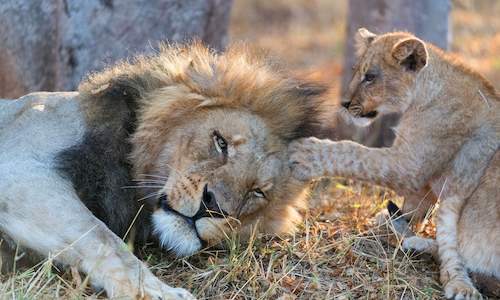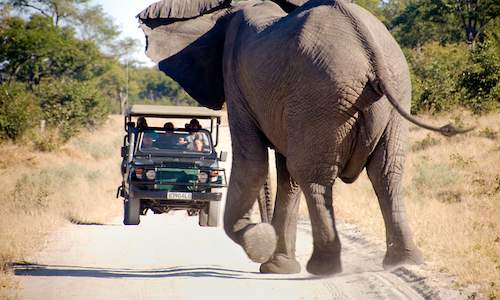
By Leigh Kemp
How Humans Affect Animal Behaviour
Due to human carelessness some species such as Hyena, Baboons and Monkeys begin to associate humans with food and then will become a 'problem' due to their persistence in getting food from stores and garbage facilities. Once a group has learnt that we 'store' food the information is passed on through the generations and it is virtually impossible to stop.Most of the public campsites in Botswana's parks have animals that rely on human wastage to survive.
Safari companies set up artificial waterholes in front of their lodges to attract game and this in turn leads animals to associate lodges with water. In drier areas this can become a problem when the waterholes run dry. Elephants can sense water in underground pipes and will dig up the pipes to get to the water.
In some parks in east Africa Lions use safari vehicles for shade. They lie next to the vehicle and when the vehicle moves off they move to another stationery vehicle. Cheetahs use stationery safari vehicles as vantage points when looking for prey. They jump up onto the bonnets, or even roofs, of the vehicles.
Lions and upright figures
There is a theory that lions have an inherent fear of figures walking upright ie humans. There is a debate as to the source of this fear. One theory is that it is innate and stems from the time that our ancestors were hunters on the African plains. The second theory is that it is a learned fear from recent history when hunters with rifles walked the land. Either of the theories point to association with danger.Guiding a walk one morning in the Okavango Delta we came across a pride of Lions about 50m up ahead. When they caught sight of us they got up and ran off. After the walk I decided to drive to the area they had disappeared to. They were about 2 km from where we had first seen them.
There was no reaction to the vehicle and I managed to drive very close to them. Some of the adults still kept a weary eye in the direction from which they had seen us. A Giraffe appeared from that direction and they flinched in anticipation of running away. They relaxed again when they saw it was a Giraffe.
The vehicle in this instance was not considered a danger giving truth to the fact that lions associate humans as danger by sight and not scent. This vehicle/human situation can be applied to most species that have come into contact with humans in the wilderness areas.
In areas where animals are hunted and shot from vehicles the animals will react to the sound of an approaching vehicle. In some cases animals will even differentiate the sounds of vehicles. This is definitely a learned behavioral trait as mechanization is relatively new.
Reactions to Motors
I was observing a lone Hippo that was acting strangely in a side pool of the Okavango Delta. It seemed very nervous, moving around constantly and reacting to any movement on the shore.
A Giraffe walked out of the bush towards the water, stopping to look around, not far from where the Hippo was. I started the motor to move off when the Hippo charged through the water toward the Giraffe. I turned the motor off and the Hippo moved back to its original position.
After a while I started the motor again and the same thing happened. This time the Giraffe moved back to the bush. I turned the motor off again and the hippo moved back to its position. Why was it associating the Giraffe with the sound of the vehicle and why was it reacting to sound of my engine?As I was pondering on this I noticed a movement at the Hippo's side. It was the smallest hippo I had ever seen. It was obviously very young as the mother had not moved back to the rest of the pod yet but why had the mother reacted to the sound of the motor in such a way.
I can only surmise that, and others have agreed, the mother had been harmed by a motor boat before and associated motor sounds with danger to her calf. Why she associated the Giraffe with the motor is still unclear.

 Learn about animal behavior and why animals do what they do in the wild - and what signals to look out for while you are on safari in Botswa...
Learn about animal behavior and why animals do what they do in the wild - and what signals to look out for while you are on safari in Botswa... Animal Behaviour changes over time to adapt to changing climatic and situational changes and today the human impact is felt mostly when it c...
Animal Behaviour changes over time to adapt to changing climatic and situational changes and today the human impact is felt mostly when it c...